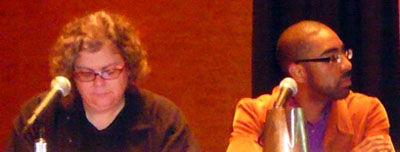One of my most anticipated SXSW 2011 panels was "Social Media is Science Fiction". What do science fiction stories tell us about how social networking and user-generated content will evolve? How it will affect us as a civilization? These topics were debated by Annalee Newitz and Charlie Jane Anders of the futurist magazine io9.com, Matt Thompson from NPR, science fiction writer Maureen McHugh, and artist Molly Crabapple.
So, what future trends in the society are driven by social media?
Pushing us to create authentic selves
Social media, especially Facebook, pushes us to maintain a single, solid avatar, says Annalee Newitz. (Interestingly, the panelists used the word "avatar" to mean not just userpics, but entire digital selves, or digital personas.) It wants us to expose all the different aspects of our lives, and to consolidate them into one. For the first time in human society we are seeing a new man, who has to be authentic, who has to be the same person in every context: as a worker, as a "john", as a father or as a child. Maybe this authenticity is good, it's pushing us not to be hypocrites, says Newitz. But also it's making us more and more of an open book, vulnerable in new ways. Molly Crabapple says: "A delusion we have is that only cool people will read our updates. At 13, I genuinely believed that my updates will be read only by sympathetic audience." The reality is, says Newitz, that you might tweet "I just got my period", and you'll get an ad from Tampax. (She says she marks all Facebook ads as offensive.)

Maureen McHugh and Matt Thompson. More pictures from SXSW 2011 are in my photo gallery.
Controlling the image we present to the world on social networks is becoming more difficult. A teenager may carefully pose in a mirror to make sure their self-portrait looks just right, but Google, already on the way to becoming an AI, may outrank it with more candid shots of him or her. It is as if, after all that posing, you walk by a shop window, and catch a glimpse of yourself, and think "OMG, do I look like that?" says Maureen McHugh.
If you don't control your own "avatar", who does? If you interact with another person, does the content of that interaction equally belong to both people to record, tweet, post, and make as public as either of them wishes? Do you reserve a right to make just your half public? But since that's usually impossible without revealing too much about the other party, how should this be resolved? Back in the day when most conversations and interactions left no record, it was not a question. A society where everything is recorded requires new rules and protocols. This is already being addressed by science fiction. Annalee Newitz recommends a novel "Quantum Thief" by Hannu Rajaniemi, a far future fantasy where everybody has an organ in their brain that's a privacy negotiator. Such a negotiation may determine, for example, what information you will remember after a meeting with somebody.
Societal memory
Matt Thompson observes that social media is increasingly about memory. He would like to see social media serve as a storage component of the society. All the tweets, pictures and videos could provide an incredibly detailed look at our society for future historians. (If that data is appropriately organized and mined, I might add.)
Has social media changed storytelling?
This was a question from the audience to Maureen McHugh, who is a science fiction writer that also writes for an alternate reality game company, Fourth Wall Studios. McHugh says that in the last 10 years she has discovered that traditional story still works very well, and interactive storytelling doesn't make it better. Hamlet does not become a better play if the audience gets to select the ending. Audiences want characters to be either happy or punished, and sometimes the story isn't good if the characters are happy or punished too soon. Charlie Jane Anders adds that she allowed the audiences to select a story ending twice. She tweeted, which story ending do you like better? And she chose the ending they selected.
By the sound of it, the panelists are more inclined to be grim than optimistic about social media-shaped future. Molly Crabapple observed that the recent trend of gamification may restructure future workplace in such a way that it would require us participate in game-like challenges with no pay -- the "fun" we'll be having will be its own reward. "You will go to Walmart and participate in the box-lifting challenge. You'll see who can lift and stack the most boxes and the prize will be what used to be your salary." (Thanks to Dale Roe for that quote. His own take on this panel can be found in this Austin American-Statesman blog post.)

Molly Crabapple, Charlie Jane Anders, and Annalee Newitz. More pictures from SXSW 2011 are in my photo gallery.
In the end, Annalee Newitz asked all panelists to end the panel on a positive note on social media. The panelists took turns telling what good things social media has brought into their lives.
Maureen McHugh. I keep in touch with my kid via social media every day.
Molly Crabapple. I founded a company with no money that has branches in 28 cities, because of social media.
Matt Thompson. Craigslist is a miracle. It has helped my life in giant, immeasurable ways, including that this is where I found my partner. There are opportunities for connection, and for us to step outside our worlds, that we are only just beginning to appreciate.
Annalee Newitz. I work at home alone with my cats, so for me Twitter is like being at work, it's my social contact. I sit there and have all those conversations via Twitter.




No comments:
Post a Comment